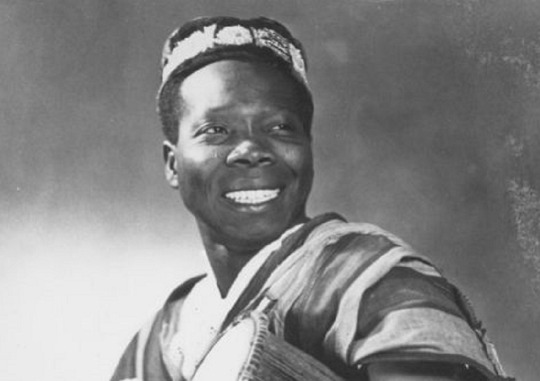#iyafin
Explore tagged Tumblr posts
Photo

Introducing the West to world music, this Nigerian drummer also fought segregation with MLK, Malcolm X
From a Yoruba family in Lagos State, Nigeria, Babatunde Olatunji, while living in the U.S. after winning a scholarship to study at Morehouse College in Atlanta, wanted to become a diplomat. Thus, after graduating from Morehouse in 1954, he enrolled in the Graduate School of Public Administration and International Relations at New York University.
But two things later moved him towards a career in music. The first was his visit to Ghana as a delegate to the All African People’s Conference organized by Ghanaian president Kwame Nkrumah, who told him he thinks he should be a cultural ambassador. The second was his meeting with Columbia Records producer John Hammond after a concert at New York’s Radio City Music Hall. Hammond would help Olatunji produce his 1959 debut Drums of Passion album which some say may have been the first African music release recorded in a modern U.S. studio.
That album became a major hit, selling millions of copies globally and helping introduce Americans to world music. Olatunji would go on to promote African music, earning a Grammy nomination, being behind compositions for Broadway and Hollywood, as well as appearing on programs including the Tonight Show, the Mike Douglas Show and the Bell Telephone Hour.
In 1964, after performing at the New York World Fair’s African Pavilion, he used the proceeds to open his own Olatunji Center for African Culture in New York’s Harlem neighborhood, where he offered classes in African dance, music, language, folklore, and history. Soon, Olatunji became highly recognized as a pioneer in the fusion of African music and jazz. “…We were playing ‘Afro-jazz’ before anybody called it that,” the recording artiste, who grew up in a fishing village in Nigeria where drumming accompanied every celebration, recalled in an interview.
But while his contribution to music is well known, his commitment to social activism is rarely talked about. “He really deserves to be remembered more for his role as a political activist in the US civil rights movement – before it was even a movement,” Robert Atkinson, who collaborated with Olatunji on his autobiography The Beat of My Drum, was quoted by the BBC in a report. Indeed, Olatunji’s social activism work started right from his days at Morehouse, where he debunked common myths about Africa.
“They [classmates] had no concept of Africa,” he recalled. “They asked all kinds of questions: ‘Do lions really roam the streets? Do people sleep in trees?’ They even asked me if Africans had tails! They thought Africa was like the Tarzan movies. Ignorance is bliss, but it is a dangerous bliss. “Africa had given so much to world culture, but they didn’t know it.”
Thus, Olatunji started educating his colleagues about Africa, including its cultural traditions and music. He then went ahead to play African music at university social gatherings while organizing and performing at concerts featuring African and African-American students. These activities were during the height of Jim Crow, and soon, Olatunji was organizing students to challenge the status quo in the south.
Even before Rosa Parks would spark the Montgomery bus boycott, Olatunji was already staging protests on public buses with some of his fellow students.
As president of the Morehouse student body in the 1950s, he was able to meet scores of civil rights leaders, including Martin Luther King Jr and Malcolm X. As a matter of fact, when King delivered his historic I Have a Dream speech in August 1963 during the March on Washington, Olatunji was among the over 200,000 people at the event. The percussionist, social activist and educator performed many times for the NAACP and King’s Southern Christian Leadership Conference.
And at many civil rights rallies, Malcolm X would request him to drum. The man, who is to date described as “the father of African drumming in the U.S.”, was also on the civil rights jazz album We Insist! with playwright Oscar Brown Jr and Max Roach. Back home in Africa, Olatunji was also a part of the anti-colonial resistance movements that had risen across the continent, attending the All African People’s Conference organized by Nkrumah.
The conference, attended by delegates from African countries, prominent African Americans and liberation movements, held discussions on how to achieve continental freedom. Nkrumah had argued that Ghana’s independence would be meaningless if other African states are still colonized by the European powers, and Olatunji couldn’t agree more.
As stated in a report, his involvement in the civil rights movement in the U.S. was largely inspired by the several forms of resistance to colonialism that was occurring in Africa. “He saw himself as a pan-Africanist who always reached out to unify Africans and African Americans,” his wife, Iyafin Ammiebelle Olatunji, told BBC in an interview.
Olatunji in his last years continued to perform while teaching others about African culture and drumming. Before he passed away in 2003 aged 76, he had become known for recordings such as “Celebrate Freedom, Justice and Peace”, “Healing Rhythms, Songs and Chants”, as well as the 1998 Grammy-nominated release, on Chesky Records of “Love Drum Talk”.
#chesky records#olatunji#pan african#african#africans#bbc#african american#malcolm x#max roach#oscar brown jr#nkrumah#iyafin#kemetic dreams#dr martin luther king jr
162 notes
·
View notes
Photo

This is my grandmother! Iyafin Omoshalewa Ammiebelle Olatunji—whom some or perhaps all of you have come to know simply as Gaga! But she is the contrary; far from simple. This image depicts the beauty and regality of a queen (that which she is —and I dare you to try and tell her differently). What it doesn't immediately show is the warrior. The rule breaker. The defiant force who never takes no for answer and instilled the same attributes in her children and grandchildren.... #InternationalWomensDay #WomensRightsAREhumanRights
0 notes